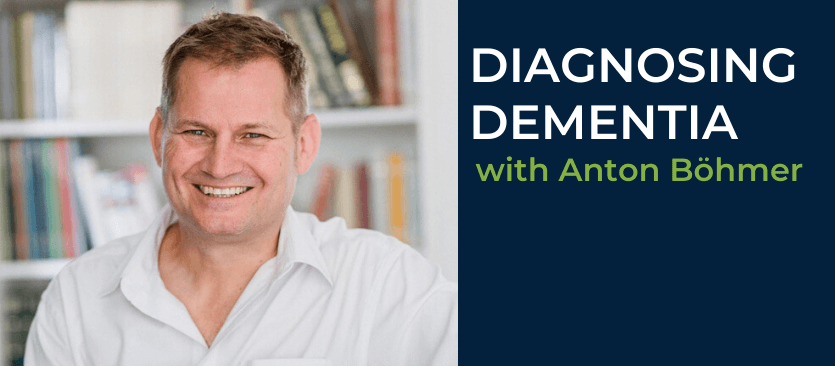Anton is a Clinical Psychologist, based in Stellenbosch, with a strong interest in neuro-/cognitive psychology, especially in the early identification of dementia. He is also the host of Wie is Ek?, a radio program on RSG that discusses multiple psychological and medical topics. Anton is a regular speaker at our Dementia Conversations events and this month we chatted to him about diagnosing dementia.
Talk us through what is involved in a dementia assessment? What can a family expect?
There are different ways to identify and make a diagnosis of a form of dementia or, importantly, to rule it out. Most people start at their GP to discuss their concerns about a loved one. In most cases it will relate to memory. An important component will be to rule out physical problems (such as an infection) through blood tests.
The next step will be to see a specialist, someone with expert knowledge in memory difficulties and dementia. This may be a neurologist, psychiatrist (with expertise in this area) or clinical psychologist who is able to perform a thorough evaluation of different abilities.
When meeting with a family, I will have an initial interview to gain an overview of their concerns, ask about a person’s personal, occupational and medical history and ask specific questions about changes they might have noticed in a person’s behaviour (e.g. activities that they find more difficult), other abilities (e.g. memory, language, planning) and in some cases personality.
The focus is however is to create a safe space as I need to use different tests to look at the person’s abilities, to compare that with other people of a same age as well as to compare the person’s different abilities with each other. The ideal outcome would be that the person shows good consistency in different abilities and similar to most people their age and occupational background. If this is not the case, I make use of the information from my assessment to determine if a diagnosis is appropriate and what that would be (as there are different kinds of dementia).
A brain scan is useful. Even though a diagnosis of dementia cannot be based upon a scan, it helps to rule out other problems (e.g. a brain tumour or a small stroke) and can identify changes in specific parts of the brain.
Lastly, the person and their family will receive feedback from my assessment as well as recommendations. This may include consideration for mediation that may be beneficial, emotional support, more information and planning for the future.
How can the family prepare their loved one for a dementia assessment before their visit?
Usually there have been conversations within a family when they notice changes in someone’s actions or ability to concentrate and remember information. In my opinion, the most important message is to address uncertainty if there is a problem or not. I need to add, it is very important to make a dementia diagnosis as early as possible. When this is the case, the person will play an important role in decision making regarding medication and other changes that may be needed.
Often families wait until problems start to interfere with a person’s abilities to perform their daily activities or when there is risk for things to go wrong (e.g. forgetting something on the stove, getting lost, problems driving or being taken advantage off financially). At times point support may need to be more drastic in order to keep balance and to secure safety for the person. This can be very upsetting for everyone involved.
We understand that there is no one test to diagnose dementia, but what is the most widely used cognitive assessment tool?
Traditionally short 30-point tests like the Mini Mental State Examination (MMSE) or Montreal Cognitive Assessment (MOCA) are used and understood by most doctors and professionals working with older people. I use the 100-point Addenbrooke Cognitive Examination-Revised (ACE-R) as initial test. These are helpful but scratching the surface.
When I conduct a thorough assessment, I use a variety of tests that provides more information on concentration and memory, executive functions (for planning and more abstract planning and organising abilities), processing speed and language skills. In addition, observing a person to detect difficulties in speech, posture and attention as well as asking them to perform or repeat certain practical tasks provide more information.
There is a rise in young-onset dementia, do you diagnose patients younger than 50?
Yes, I do. As difficulties in younger people may “look” different than in people older than 65, it may involve other tests as well. In addition, as with older people is important to rule out other problems that may results in concentration and memory difficulties. A good example is depression.
What advice do you have for families that are concerned about a loved one who’s showing signs of dementia?
Be supportive and caring. Don’t jump to conclusions but keep track of your concerns. In forms of dementia such as Alzheimer’s disease difficulties don’t appear overnight. It starts in very subtle changes. For example, forgetting to fetch something from the kitchen or to buy the correct items at the shop.
Know that help is available. This comes in various forms, both emotional and practical. It needs to start at the correct diagnosis. As types of dementia differs, people may have different needs. In addition, when medication is considered, the type of dementia and associated challenges will influence what will be prescribed.
Knowing what the problem is helps the family to make future plans. This includes decisions about you as a couple or family value, what you would like to do and to focus on what matters and are meaningful to live a quality life with dementia.
How can families reach you to book an appointment?
They can contact our office at “Wie Is Ek” directly on 021 88 33 272 or email me at [email protected]
